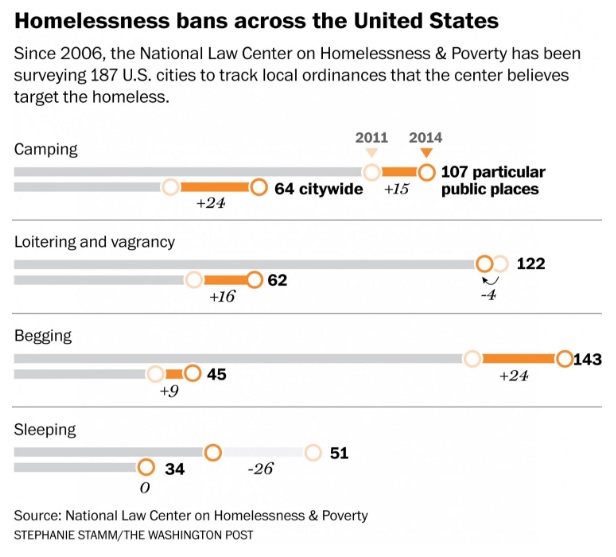Ending Criminalization on the Federal Level
On August 6, 2015, the Department of Justice filed a statement of interest brief supporting our position in a case opposing a Boise, ID anti-camping ordinance brought by the Law Center and Idaho Legal Aid Services, with the pro bono support of Latham & Watkins LLP.
Less than a week later, the U.S. Interagency Council on Homelessness (USICH) released Ending Homelessness for People Living in Encampments: Advancing the Dialogue. This comes following a year-long consultation process prompted by the 2014 report Welcome Home: The Rise of Tent Cities coauthored by the Law Center and Yale Law School Lowenstein Human Rights Clinic.
Consistent with the recommendations of that report, the guidance calls on communities to take a constructive approach in addressing encampments.
The Law Center has also been working with the U.S. Department of Housing and Urban Development to ensure that alternatives to criminalization are widely available to communities and advocates through a new page on their website. You will also find some new resources from the Law Center. In addition, the cost of criminalizing homelessness just went up. HUD is asking communities about the criminalization of homelessness, and awarding up to two points on funding applications for communities that don’t criminalize, or are actively reducing criminalization measures. Watch our free webinar on what this means for your community.
The federal government is taking significant steps to oppose criminalization of homelessness. As we continue to make progress, it is essential to remember that ending the criminalization of homelessness is critical to ending homelessness itself.
Visualizing the Criminalization of Homelessness
On December 13, 2015, PBS News Hour created an interactive map that "shows the cities across the country that have instituted bans on sleeping outdoors, sitting and loitering in public places and living in vehicles" based on our No Safe Place report. This survey of 187 cities, selected for their geographic and demographic diversity, is not a comprehensive list of all cities which are currently using criminalization practices. To see the original post by PBS News Hour, click here.
In an article published on June 2, “Homeless say booming cities have outlawed their right to sleep, beg and even sit,” The Washington Post highlighted the increase in laws targeting the homeless and how homeless people are challenging such laws.


.jpg)

